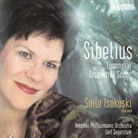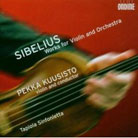November 2006
Though written for voice and orchestra, Luonnotar is definitely orchestral, and not exactly a song -- rather more in the nature of a symphonic poem with a sung text (from the beginning of the Kalevala, the Finnish national epic), Whatever its designation, it is given a phenomenal performance here. The marvelous Soile Isokoski surpasses her own earlier recording with Neeme Järvi on Deutsche Grammophon; Segerstam is at his formidable best, neither merely "accompanying" nor imposing his own will over the natural momentum the singer finds in the work. And so it is throughout the 18 other pieces, all of them definitely songs, and remarkably beautiful ones. Only four have Finnish texts, the others being Swedish, all characterized by an uncontrived poignancy that would attract just such a composer as Sibelius. Some of the songs were orchestrated by the composer, some by others well attuned to his style. Ondine provides full texts with excellent English translations, and the wide-open, beautifully balanced sonic frame leaves absolutely nothing to be desired. Impeccable sonic balance is also a striking asset of the violin/orchestral package. Pekka Kuusisto has the measure of the charming Op. 117 Suite (the very last work Sibelius gave an opus number, and unheard until 1990) and the more dramatic little serenades down to the ground. He is similarly persuasive in the Swanwhite Suite, which has no solo part for him. But in revealing the magic of the more substantial Humoresques, with their broader range of mood and color, Aaron Rosand set a standard in his premiere integral recording that no subsequent violinist has matched. Kuusisto comes no closer than the rest, coming across, particularly in the whimsical No. 5 in E-flat, as disappointingly plodding and charmless. Much as you may enjoy the rest of this disc, you must have Rosand’s elegantly enlivening account of the Humoresques [Vox CDX 5116]. GO BACK TO: |
 Sibelius - Luonnotar;
Orchestral Songs
Sibelius - Luonnotar;
Orchestral Songs Sibelius
- Six Humoresques; Two Serenades; Suite for Violin and String Orchestra;
Swanwhite Suite
Sibelius
- Six Humoresques; Two Serenades; Suite for Violin and String Orchestra;
Swanwhite Suite